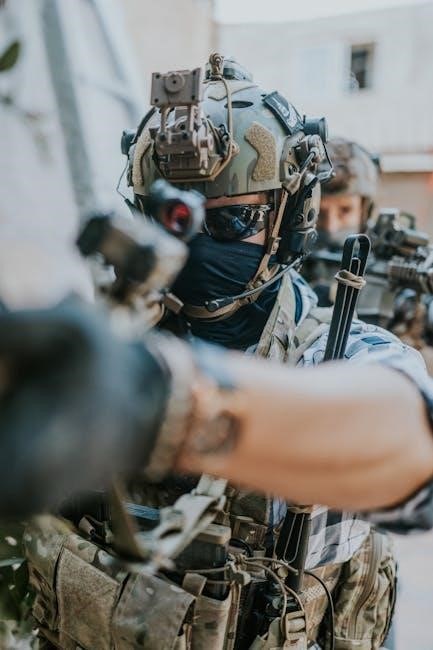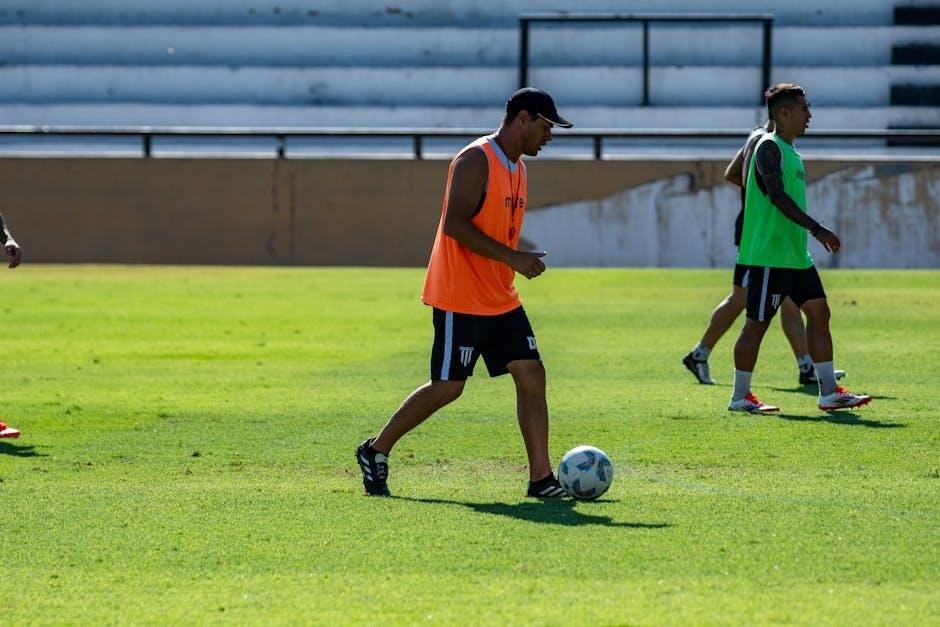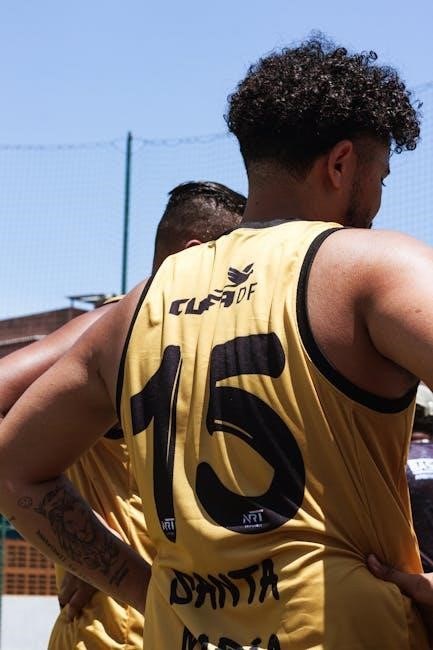Short-term team training is essential for ensuring effectiveness in mission trips. It provides a structured approach to preparation, fostering collaboration and cultural awareness. Key objectives include equipping members with necessary skills, promoting spiritual growth, and ensuring a unified team vision.
1.1 Importance of Structured Training for Short-Term Teams
Structured training is crucial for short-term teams to ensure effectiveness and alignment with mission goals. It fosters collaboration, cultural awareness, and spiritual preparation, which are vital for a successful trip. Without proper training, teams may struggle with communication, cultural misunderstandings, and logistical challenges. A well-designed program equips members with practical skills, such as budgeting, logistics, and leadership, while also addressing emotional and spiritual readiness. Training helps teams understand their roles, build unity, and adapt to unfamiliar environments. It also ensures that members are prepared to represent their organization ethically and responsibly. By investing in structured training, teams can maximize their impact, build lasting relationships, and return home with a meaningful experience. Effective training is the foundation for a successful and transformative short-term mission trip.

1.2 Key Objectives of a Short-Term Training Program
A well-structured short-term training program aims to equip teams with essential skills and knowledge for successful mission trips. Primary objectives include fostering cultural awareness, building teamwork, and ensuring spiritual preparation. Training also focuses on practical skills like budgeting, logistics, and leadership development. Additionally, it helps teams understand their roles and responsibilities, adapt to new environments, and engage effectively with local communities. The program should also address safety protocols, cross-cultural communication, and conflict resolution. By achieving these objectives, teams can maximize their impact, build meaningful relationships, and return home with a transformative experience. A comprehensive curriculum ensures that all aspects of the trip are covered, from pre-trip planning to post-trip reflection. Effective training empowers teams to serve with confidence, humility, and a clear sense of purpose.

Pre-Trip Preparation and Planning
Effective pre-trip preparation is crucial for a successful mission. Key steps include recruiting, training, and planning logistics. Teams must also address cultural awareness, set clear timelines, and allocate resources efficiently. Defining roles and expectations ensures a smooth journey.
2.1 Recruiting and Selecting Team Members
Recruiting and selecting team members is a critical step in pre-trip preparation. Start by identifying individuals with a passion for the mission and necessary skills. Use applications, interviews, and reference checks to assess suitability. Ensure team members are spiritually prepared and flexible. Consider diversity in skills, experiences, and perspectives to foster collaboration. Prayerfully select individuals who align with the mission’s goals and values. Provide clear expectations and roles to ensure alignment. Assign responsibilities based on strengths and interests to maximize effectiveness. A well-chosen team lays the foundation for a successful and impactful trip. Encourage commitment and accountability from the outset. This process ensures a cohesive and dedicated group ready to serve effectively.
2.2 Developing a Comprehensive Training Curriculum
A well-structured training curriculum is vital for preparing short-term team members. It should cover pre-trip, during, and post-trip phases to ensure holistic preparation. Key components include cultural awareness, spiritual preparation, and practical skills like budgeting and logistics. Incorporate interactive methods such as workshops, case studies, and group discussions to enhance engagement. Utilize resources like manuals and online courses tailored for short-term missions. Address topics such as team dynamics, conflict resolution, and adaptability to diverse environments. Ensure the curriculum aligns with the mission’s objectives and values. Regularly assess and adjust the training based on team needs and feedback. A comprehensive curriculum equips members with the knowledge, skills, and mindset necessary for a successful and impactful mission trip.
2.4 Setting Clear Expectations and Goals
Establishing clear expectations and goals is crucial for a successful short-term mission trip. Define roles and responsibilities for each team member to ensure accountability and harmony. Outline behavioral expectations, such as respect for cultural norms and adherence to safety protocols. Set SMART (Specific, Measurable, Achievable, Relevant, Time-bound) goals aligned with the mission’s objectives. Communicate these expectations during training sessions and provide written guidelines for reference. Ensure team members understand their contribution to the larger mission and how their efforts impact the community they serve. Regularly review and align personal and team goals to maintain focus and motivation. Clear expectations foster unity, purpose, and a shared vision, leading to a more effective and fulfilling experience for all involved.
During the Trip: Managing Team Dynamics
Effective team dynamics require strong leadership, open communication, and cultural sensitivity. Foster collaboration, address conflicts promptly, and encourage mutual respect among members to maintain harmony and focus on shared goals.
3.1 Building Team Harmony and Collaboration
Building team harmony and collaboration is crucial for the success of short-term trips. Leaders should encourage open communication and create opportunities for bonding through shared activities. Team-building exercises, such as group devotions or collaborative problem-solving, foster trust and unity. Assigning roles like prayer coordinators or blog writers ensures everyone contributes meaningfully. Addressing conflicts promptly and promoting active listening helps maintain a positive environment. Cultural sensitivity training also plays a key role in fostering respect and understanding among team members. By nurturing these elements, teams can work cohesively, enhancing their impact and overall experience during the trip. This approach not only strengthens relationships but also prepares members to serve effectively in diverse settings. Harmony within the team is essential for achieving the trip’s objectives and creating lasting memories.
3.2 Cultural Awareness and Sensitivity Training
Cultural awareness and sensitivity training is vital for short-term teams to navigate diverse environments effectively. This training equips members with the skills to respect and understand local customs, traditions, and social norms. It emphasizes the importance of humility, open-mindedness, and empathy when engaging with different cultures. Through interactive exercises and discussions, teams learn to avoid cultural misunderstandings and foster positive interactions. Practical resources, such as guides and manuals, provide insights into specific cultural practices and expectations. Leaders should encourage team members to embrace cultural differences as opportunities for growth and mutual learning. By prioritizing cultural sensitivity, teams can build stronger relationships with local communities, enhancing their ministry impact. This training not only promotes cross-cultural effectiveness but also enriches the team’s overall experience. It is a cornerstone of successful short-term mission trips.
3.3 Daily Operations and Logistics Management
Daily operations and logistics management are crucial for the smooth execution of short-term trips. Effective planning ensures that all activities run seamlessly, minimizing disruptions and maximizing impact. This involves creating detailed itineraries, coordinating transportation, and managing resources efficiently. Logistics management also includes securing accommodations, arranging meals, and handling financial transactions. Team leaders must communicate clearly with members about schedules and expectations. Practical tools, such as checklists and budgeting guides, help maintain organization and accountability. Additionally, contingency plans are essential to address unexpected challenges. By prioritizing logistics, teams can focus on their mission objectives while ensuring safety and comfort. Comprehensive training resources, like manuals and leader guides, provide step-by-step instructions for managing daily operations effectively. This ensures that all aspects of the trip are well-coordinated, allowing the team to fulfill its purpose successfully.

Post-Trip Activities and Follow-Up

Post-trip activities ensure long-term impact by fostering reflection and growth. Debriefing sessions, feedback collection, and follow-up plans are essential for evaluating experiences and encouraging ongoing engagement. Teams can share lessons learned and stay connected.
4.1 Debriefing and Reflecting on the Experience
Debriefing is a critical post-trip activity that helps teams process their experiences. It allows members to reflect on successes, challenges, and personal growth. Structured debriefing sessions encourage open dialogue, helping individuals and the group as a whole to identify key takeaways. This process also fosters emotional closure and provides a platform to share stories and lessons learned. Leaders should guide the conversation to ensure all voices are heard and insights are captured. Reflection activities can include journaling, group discussions, or creating a trip report. These practices not only deepen understanding but also provide valuable feedback for future trips. By intentionally reflecting on the experience, teams can maximize the long-term impact of their efforts and carry forward the lessons learned. Debriefing is essential for personal and collective growth, ensuring the trip’s legacy endures beyond the immediate journey.
4.2 Collecting Feedback and Evaluating Impact

Collecting feedback and evaluating impact are crucial steps in assessing the effectiveness of a short-term team training program. Surveys, focus groups, and one-on-one interviews are effective tools for gathering insights from team members, leaders, and stakeholders. This feedback helps identify strengths, areas for improvement, and the overall influence of the training on the team’s performance. Evaluation should also consider the program’s alignment with its objectives, such as skill development, cultural awareness, and team cohesion. By analyzing the feedback, organizations can refine their training curriculum, improve logistics, and enhance future trips. Measuring the long-term impact of the training on participants and the communities served is equally important. This ensures that the efforts are meaningful and sustainable, providing a strong foundation for future endeavors. Feedback and evaluation are essential for continuous improvement and maximizing the program’s effectiveness.
4.3 Encouraging Ongoing Engagement and Growth

Encouraging ongoing engagement and growth is vital for sustaining the momentum gained from short-term team training. Post-trip activities, such as debriefing sessions and reflective exercises, help team members process their experiences and integrate lessons learned into their daily lives. Creating opportunities for continued involvement, like leadership roles or mentorship programs, fosters a sense of community and shared purpose. Providing resources for further development, such as online courses or workshops, empowers individuals to deepen their skills and understanding. Encouraging team members to share their stories and insights with others can inspire and motivate others to engage in similar endeavors. By nurturing a culture of continuous growth and engagement, organizations can ensure that the impact of the training extends far beyond the trip itself, leading to long-term personal and professional development for participants. This approach also strengthens the organization’s mission and fosters a legacy of service and learning.